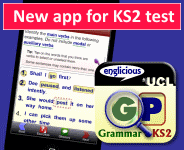Glossary
The Englicious Glossary includes the new National Curriculum glossary terms, which are shown against a white background. However, there's much more to be found here:
- we have added many entries that we feel are important, but cannot be found in the NC Glossary (e.g. connective), and
- in many cases we have added information to the (often very brief) NC entries that need further explanation (e.g. clause and phrase).
Please note that in line with our practice throughout the site, we use capital letters for function terms such as Subject, Direct Object, Indirect Object, Modifier, etc. Although this convention is not followed in the documentation published by the Department for Education we have also done so in the text that forms part of the National Curriculum Glossary.
Tip: Within our units and resources, Glossary items appear highlighted within the text. When you hover over them, or click on them in the Slideshow, a popup is generated.
Received Pronunciation
Received Pronunciation (often abbreviated to RP) is an accent which is used only by a small minority of English speakers in England. It is not associated with any one region. Because of its regional neutrality, it is the accent which is generally shown in dictionaries in the UK (but not, of course, in the USA). RP has no special status in the National Curriculum.
recipient
reciprocal pronoun
referential it
reflexive
register
'Register' is a broad description of the type of sociolinguistic context of written and spoken language, similar to genre in meaning.
Classroom lessons, football commentaries and novels use different registers of the same language, recognised by differences of vocabulary and grammar. Registers are ‘varieties’ of a language which are each tied to a range of uses, in contrast with dialects, which are tied to groups of users.
- I regret to inform you that Mr Joseph Smith has passed away. [formal letter]
- Have you heard that Joe has died? [casual speech]
- Joe falls down and dies, centre stage. [stage direction]
'Register' is frequently used to refer to the degree of formality/informality of a text (a property arising out of the situation), whereas genre tends to have a more traditional 'library classification' meaning (e.g. instructional/informative, fiction/non-fiction).
relational verb
relative clause
A relative clause is a special type of subordinate clause that modifies a noun. It often does this by using a relative pronoun such as who or that to refer back to that noun, though the relative pronoun that is often omitted.
A relative clause may also be attached to a clause. In that case, the pronoun refers back to the whole clause, rather than referring back to a noun.
In the examples, the relative clauses are in red, and both the pronouns and the words they refer back to are in bold.
- That’s the boy who lives near school. [who refers back to boy]
- The prize that I won was a book. [that refers back to prize]
- The prize I won was a book. [the pronoun that is omitted]
- Tom broke the game, which annoyed Ali. [which refers back to the whole clause]
relative pronoun
root word
Root words are words that can stand alone, unlike prefixes and suffixes, which cannot stand alone.
Morphology breaks words down into root words, which can stand alone, and suffixes or prefixes which can’t. For example, help is the root word for other words in its word family such as helpful and helpless, and also for its inflections such as helping. Compound words (e.g. help-desk) contain two or more root words. When looking in a dictionary, we sometimes have to look for the root word (or words) of the word we are interested in.
- played [the root word is play]
- unfair [the root word is fair]
- football [the root words are foot and ball]

